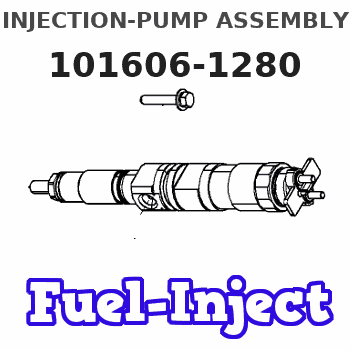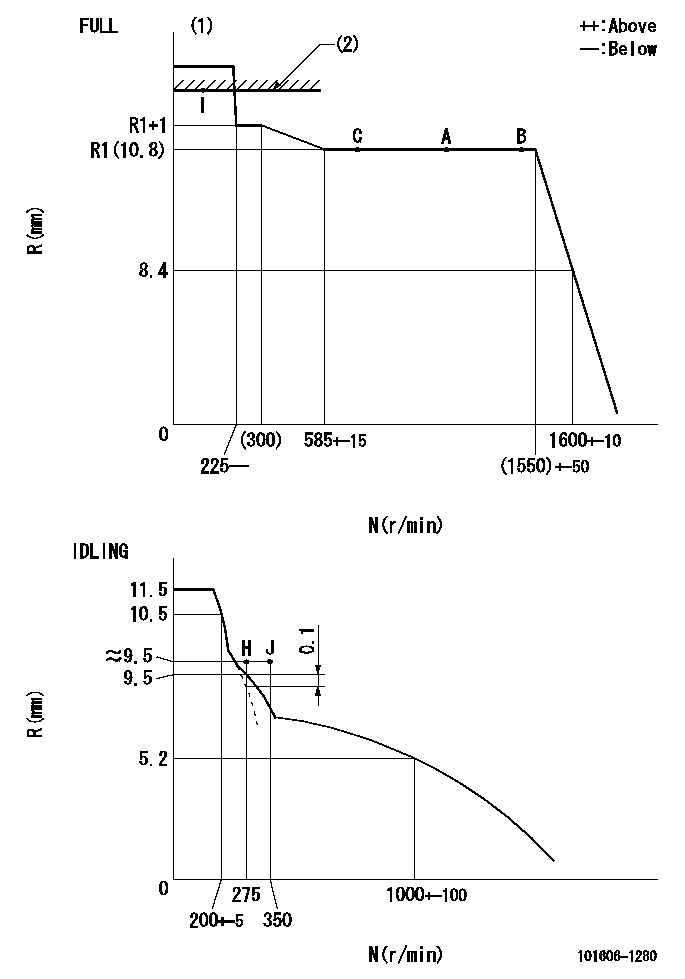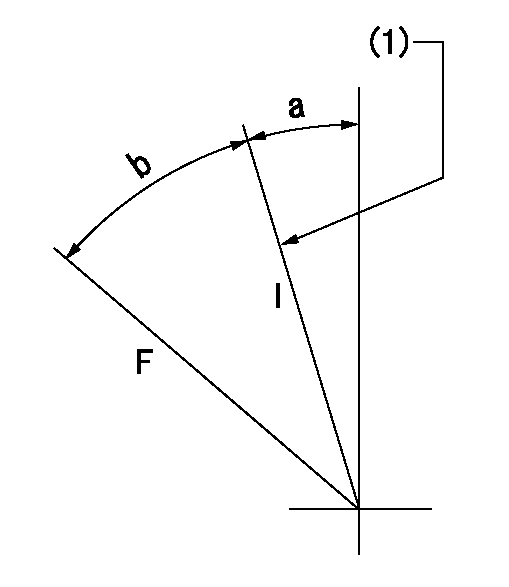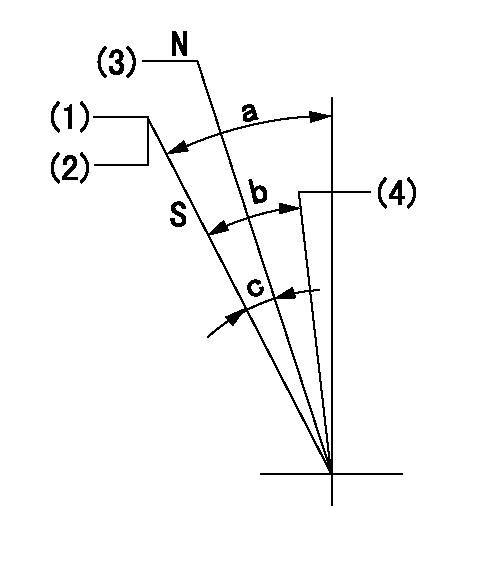Information injection-pump assembly
BOSCH
9 400 615 435
9400615435
ZEXEL
101606-1280
1016061280
MITSUBISHI
ME035391
me035391

Rating:
Include in #2:
104746-6033
as _
Cross reference number
BOSCH
9 400 615 435
9400615435
ZEXEL
101606-1280
1016061280
MITSUBISHI
ME035391
me035391
Zexel num
Bosch num
Firm num
Name
101606-1280
9 400 615 435
ME035391 MITSUBISHI
INJECTION-PUMP ASSEMBLY
6D14 * K
6D14 * K
Calibration Data:
Adjustment conditions
Test oil
1404 Test oil ISO4113 or {SAEJ967d}
1404 Test oil ISO4113 or {SAEJ967d}
Test oil temperature
degC
40
40
45
Nozzle and nozzle holder
105780-8140
Bosch type code
EF8511/9A
Nozzle
105780-0000
Bosch type code
DN12SD12T
Nozzle holder
105780-2080
Bosch type code
EF8511/9
Opening pressure
MPa
17.2
Opening pressure
kgf/cm2
175
Injection pipe
Outer diameter - inner diameter - length (mm) mm 6-2-600
Outer diameter - inner diameter - length (mm) mm 6-2-600
Overflow valve
131424-5520
Overflow valve opening pressure
kPa
255
221
289
Overflow valve opening pressure
kgf/cm2
2.6
2.25
2.95
Tester oil delivery pressure
kPa
157
157
157
Tester oil delivery pressure
kgf/cm2
1.6
1.6
1.6
Direction of rotation (viewed from drive side)
Left L
Left L
Injection timing adjustment
Direction of rotation (viewed from drive side)
Left L
Left L
Injection order
1-5-3-6-
2-4
Pre-stroke
mm
3.3
3.25
3.35
Beginning of injection position
Governor side NO.1
Governor side NO.1
Difference between angles 1
Cal 1-5 deg. 60 59.5 60.5
Cal 1-5 deg. 60 59.5 60.5
Difference between angles 2
Cal 1-3 deg. 120 119.5 120.5
Cal 1-3 deg. 120 119.5 120.5
Difference between angles 3
Cal 1-6 deg. 180 179.5 180.5
Cal 1-6 deg. 180 179.5 180.5
Difference between angles 4
Cyl.1-2 deg. 240 239.5 240.5
Cyl.1-2 deg. 240 239.5 240.5
Difference between angles 5
Cal 1-4 deg. 300 299.5 300.5
Cal 1-4 deg. 300 299.5 300.5
Injection quantity adjustment
Adjusting point
-
Rack position
10.8
Pump speed
r/min
850
850
850
Each cylinder's injection qty
mm3/st.
65
63
67
Basic
*
Fixing the rack
*
Standard for adjustment of the maximum variation between cylinders
*
Injection quantity adjustment_02
Adjusting point
H
Rack position
9.5+-0.5
Pump speed
r/min
275
275
275
Each cylinder's injection qty
mm3/st.
10.5
9
12
Fixing the rack
*
Standard for adjustment of the maximum variation between cylinders
*
Injection quantity adjustment_03
Adjusting point
A
Rack position
R1(10.8)
Pump speed
r/min
850
850
850
Average injection quantity
mm3/st.
65
64
66
Basic
*
Fixing the lever
*
Injection quantity adjustment_04
Adjusting point
B
Rack position
R1(10.8)
Pump speed
r/min
1450
1450
1450
Average injection quantity
mm3/st.
77.5
75.5
79.5
Fixing the lever
*
Injection quantity adjustment_05
Adjusting point
C
Rack position
R1(10.8)
Pump speed
r/min
600
600
600
Average injection quantity
mm3/st.
51.5
49.5
53.5
Fixing the lever
*
Injection quantity adjustment_06
Adjusting point
I
Rack position
14.1+-0.
5
Pump speed
r/min
100
100
100
Average injection quantity
mm3/st.
90
70
110
Fixing the lever
*
Rack limit
*
Timer adjustment
Pump speed
r/min
850
Advance angle
deg.
0.5
Timer adjustment_02
Pump speed
r/min
900
Advance angle
deg.
0.8
Timer adjustment_03
Pump speed
r/min
1200
Advance angle
deg.
2.6
2.1
3.1
Timer adjustment_04
Pump speed
r/min
1500
Advance angle
deg.
5.5
5
6
Remarks
Finish
Finish
Test data Ex:
Governor adjustment

N:Pump speed
R:Rack position (mm)
(1)Torque cam stamping: T1
(2)RACK LIMIT
----------
T1=A70
----------
----------
T1=A70
----------
Speed control lever angle

F:Full speed
I:Idle
(1)Stopper bolt set position 'H'
----------
----------
a=10deg+-5deg b=42deg+-3deg
----------
----------
a=10deg+-5deg b=42deg+-3deg
Stop lever angle

N:Engine manufacturer's normal use
S:Stop the pump.
(1)Set the stopper bolt at pump speed = aa and rack position = bb (non-injection rack position). Confirm non-injection.
(2)After setting the stopper bolt, confirm non-injection at speed cc. Rack position = dd (non-injection rack position).
(3)Rack position = approximately ee.
(4)Free (at shipping)
----------
aa=1550r/min bb=7.2mm cc=275r/min dd=8.2mm ee=17.4mm
----------
a=38.5deg+-5deg b=(27deg) c=17deg+-5deg
----------
aa=1550r/min bb=7.2mm cc=275r/min dd=8.2mm ee=17.4mm
----------
a=38.5deg+-5deg b=(27deg) c=17deg+-5deg
Timing setting

(1)Pump vertical direction
(2)Position of timer's tooth at No 1 cylinder's beginning of injection
(3)B.T.D.C.: aa
(4)-
----------
aa=16deg
----------
a=(1deg)
----------
aa=16deg
----------
a=(1deg)
Information:
Engine Mounts
Inspect
Inspect the engine mounts for deterioration and proper bolt torque. Engine vibration may be caused by improper engine mounting and/or engine mount deterioration. Any engine mount showing deterioration should be replaced. Refer to the Torque Specifications section of this publication for recommended bolt torque values. See the Marine Engine Application and Installation Guide for more information.Crankshaft Vibration Damper
Inspect
Damage to, or failure of, the crankshaft vibration damper will increase torsional vibrations and result in damage to the crankshaft and other engine components. A deteriorating damper will cause excessive gear train noise at variable points in the speed range.The damper is mounted to the crankshaft, located behind the belt guard on the front of the engine.Removal and Installation
Refer to the Service Manual for the damper removal procedure and for the damper installation procedure.Visconic Damper
The visconic damper has a weight, located inside a fluid filled case. The weight moves in the case to limit torsional vibration. Inspect the damper for evidence of dents, cracks or leaks of the fluid.Replace the damper if the damper is dented, cracked, or leaking. Refer to the Service Manual or contact your Caterpillar dealer for damper replacement.Valve Lash
Check/Adjust
Initial valve lash adjustment on new, rebuilt or remanufactured engines is recommended at the first scheduled oil change interval due to initial wear and seating of valve train components.Subsequent adjustments should be made at Every 3000 Hour interval.This maintenance is recommended by Caterpillar as part of a lubrication and preventive maintenance schedule to provide maximum engine life.
Only qualified service personnel should perform this maintenance. Refer to the Service Manual or your Caterpillar dealer for the complete valve lash adjustment procedure.
Be sure the engine cannot be started while this maintenance is being performed. To prevent possible injury, do not use the starting motor to turn the flywheel.Hot engine components can cause burns. Allow additional time for the engine to cool before measuring/adjusting valve lash clearance.
Operation of Caterpillar engines with improper valve adjustments will reduce engine efficiency. This reduced efficiency could result in excessive fuel usage and/or shortened engine component life.
Valve Rotators
When inspecting the valve rotators, protective glasses or face shield and protective clothing must be worn, to prevent being burned by hot oil or spray.
A valve rotator which does not operate properly will accelerate valve face wear and valve seat wear and shorten valve life. If a damaged rotator is not replaced, valve face guttering could result and cause pieces of the valve to fall into the cylinder. This can cause piston and cylinder head damage.
After setting the valve lash and before installing the valve covers:1. Start the engine. Follow the engine starting procedure in this manual. Operate the engine at low idle.2. Observe the top surface of each valve rotator. Each valve rotator should turn slightly each time the valve closes.If a valve fails to rotate, contact your Caterpillar dealer.Fuel Ratio Control, Set Point, and Low Idle
Check/Adjust
The fuel ratio control limits the amount of fuel to the cylinders during acceleration. This affects the amount of exhaust smoke. The
Inspect
Inspect the engine mounts for deterioration and proper bolt torque. Engine vibration may be caused by improper engine mounting and/or engine mount deterioration. Any engine mount showing deterioration should be replaced. Refer to the Torque Specifications section of this publication for recommended bolt torque values. See the Marine Engine Application and Installation Guide for more information.Crankshaft Vibration Damper
Inspect
Damage to, or failure of, the crankshaft vibration damper will increase torsional vibrations and result in damage to the crankshaft and other engine components. A deteriorating damper will cause excessive gear train noise at variable points in the speed range.The damper is mounted to the crankshaft, located behind the belt guard on the front of the engine.Removal and Installation
Refer to the Service Manual for the damper removal procedure and for the damper installation procedure.Visconic Damper
The visconic damper has a weight, located inside a fluid filled case. The weight moves in the case to limit torsional vibration. Inspect the damper for evidence of dents, cracks or leaks of the fluid.Replace the damper if the damper is dented, cracked, or leaking. Refer to the Service Manual or contact your Caterpillar dealer for damper replacement.Valve Lash
Check/Adjust
Initial valve lash adjustment on new, rebuilt or remanufactured engines is recommended at the first scheduled oil change interval due to initial wear and seating of valve train components.Subsequent adjustments should be made at Every 3000 Hour interval.This maintenance is recommended by Caterpillar as part of a lubrication and preventive maintenance schedule to provide maximum engine life.
Only qualified service personnel should perform this maintenance. Refer to the Service Manual or your Caterpillar dealer for the complete valve lash adjustment procedure.
Be sure the engine cannot be started while this maintenance is being performed. To prevent possible injury, do not use the starting motor to turn the flywheel.Hot engine components can cause burns. Allow additional time for the engine to cool before measuring/adjusting valve lash clearance.
Operation of Caterpillar engines with improper valve adjustments will reduce engine efficiency. This reduced efficiency could result in excessive fuel usage and/or shortened engine component life.
Valve Rotators
When inspecting the valve rotators, protective glasses or face shield and protective clothing must be worn, to prevent being burned by hot oil or spray.
A valve rotator which does not operate properly will accelerate valve face wear and valve seat wear and shorten valve life. If a damaged rotator is not replaced, valve face guttering could result and cause pieces of the valve to fall into the cylinder. This can cause piston and cylinder head damage.
After setting the valve lash and before installing the valve covers:1. Start the engine. Follow the engine starting procedure in this manual. Operate the engine at low idle.2. Observe the top surface of each valve rotator. Each valve rotator should turn slightly each time the valve closes.If a valve fails to rotate, contact your Caterpillar dealer.Fuel Ratio Control, Set Point, and Low Idle
Check/Adjust
The fuel ratio control limits the amount of fuel to the cylinders during acceleration. This affects the amount of exhaust smoke. The
Have questions with 101606-1280?
Group cross 101606-1280 ZEXEL
Mitsubishi
Mitsubishi
101606-1280
9 400 615 435
ME035391
INJECTION-PUMP ASSEMBLY
6D14
6D14